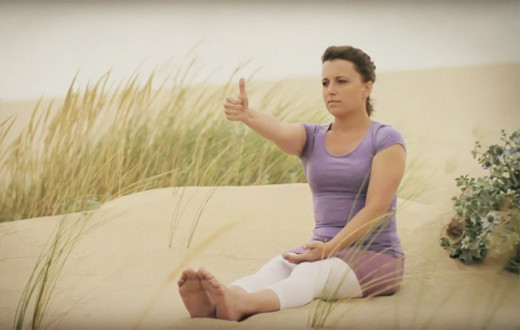By Elizabeth Herman | Posted: November 01, 2019
What makes a really good yoga teacher? Do you expect your teachers to simply present information or lead you in healthy activities? Or do excellent teachers give something more?
To know a good yoga teacher, you need to understand that yoga offers much more than just physical exercise. It isn’t just a way to make your organs work more efficiently or to make your muscles more flexible, but rather, it’s a way to create a whole new life for yourself, in body, mind, and spirit.
It takes more than coaching students in their exercises to become a good yoga teacher. When I completed a yoga teacher training course in 2017, the first step was to become a good student of yoga. By respecting the practices and giving my whole self to learning, the preparation for me to eventually give to others had begun. I had to transform my own life before I could think of transforming the lives of others.
Gurudev Sri Sri Ravi Shankar recently received a question about teaching, from the participants of Sri Sri School of Yoga Teacher Training Program in Boone, North Carolina. They asked, “There are so many yoga teachers in the world today, and teaching yoga has become a profession. Could you please speak about how we can reconcile teaching yoga as a service, versus the means of our livelihood?” A snippet of this conversation is here in the following video:
Giving to others transforms lives
Some teachers may have a limited scope in their purpose for teaching yoga, if they’re primarily interested in earning a living. As Gurudev says, it’s important to assess your goals when you become a teacher. In other words, “If you just want to give people some exercise, or if you treat yoga as exercise, you can take it as a profession. But if you want to bring about transformation in the lives of others, you cannot be money minded. It won’t work.”
Students can see the mind of a teacher, so teachers’ words and actions will easily reveal whether they want to give to students or receive. “You see, if you’re thinking in the mind about money when you’re teaching, ‘Oh, what money will I get?’ then I tell you you’re not a good teacher at all. You’re not going to be a good teacher,” says Gurudev.
As stated in the video, “A good teacher only gives, and doesn’t think about what the other person is giving back. So if you’re going to be a good yoga teacher who is going to bring about transformation in body, mind, and spirit, as a real yogi, then you should have the confidence that your needs will be taken care of by nature. So you don’t need to calculate, ‘Oh I have 20 people. How much will I get? 20 times 100, or 2000 dollars?’ Oh no, no, no, that’s gone. Because your consciousness, then, isn’t in the giving mode. The mode of it has changed and now it’s in the receiving mode. And if you’re in the receiving mode you can’t be a teacher, because a teacher is a giver. A teacher gives all that he or she has.”
A sense of satisfaction
He goes on to say that teachers need to feel a sense of abundance and satisfaction in their own lives in order to be effective. “So you have to be in that mode of giving, and when can you give? When you feel abundance, and if you feel abundance you aren’t looking for something outside.”
Teachers shouldn’t project an aura of neediness to students. “If you’re teaching to fill a lack in you, I tell you, you can’t be a good teacher. Or, if you’re teaching in order to feel good about yourself, then also, you’re not a good teacher,” says the spiritual master.
His definition of a good teacher is someone who “is centered, satisfied, and has nothing but the intention to transfer the knowledge to others. And they see teaching as a sacred duty. Usually when you think something is a duty there is no beauty in it. But if you do it thinking it is a sacred duty, then it’s a very different thing altogether.”
Intelligent practicality
At the same time, Gurudev encourages yoga teachers to be practical, and not go beyond their means when choosing venues for classes and committing to other expenses. He says, “Don’t hire an expensive hall and have only 10 students, where you can’t even pay the rent on the hall. This is an unintelligent thing to do. But be careful not to come to class with the mindset that you want to count everything that everybody is giving you and what you are making.”
A balance must be struck between the giving nature of yoga teaching and the practical necessities of creating an experience of yoga practice. Everyone must contribute toward the costs of staging classes, seminars, courses and conferences, so that students and teachers can have a pleasant environment and stay together in harmony. In such surroundings, talking about, celebrating, and learning yoga mentally, physically, and spiritually, can transform lives and make such a big difference in the world.
If you’re interested in a transformative experience of yoga, check out a Sri Sri Yoga course near you, or investigate the teacher training opportunities offered in the Sri Sri School of Yoga teacher training program. Wishing you all the best in your yogic journey!
Elizabeth Herman writes, offers writing support to clients, teaches, and volunteers for a better world. She has a PhD in Rhetoric, Composition and Literature. Find her on Facebook or Twitter.





























